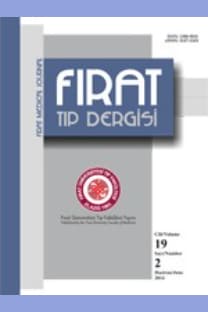Parkinson Hastalığı Demansında Rivastigminin Etkisi: Elektrofizyolojik Bir Çalışma
The Effects of Rivastigmine in Parkinson’s Disease Dementia
___
- 1. Cummings JL. Intellectual impairment in Parkinson’s disease: clinical, pathologic, and biochemical correlates. J Geriatr Psychiatry Neurol 1988; 1: 24- 36.
- 2. Aarsland D, Andersen K, Larsen JP, Lolk A, Nielsen H, Kragh-Sorensen P. Risk of dementia in Parkinson’s disease: a community based, prospective study. Neurology 2001; 56: 730-6.
- 3. Katada E, Sato K, Ojika K, Ueda R. Cognitive event-related potentials: useful clinical information in Alzheimer’s disease. Curr Alzheimer Res 2004; 1: 63-9.
- 4. Polich J, Ehlers CL, Otis S, Mandell AJ, Bloom FE. P300 latency reflects the degree of cognitive decline in dementing illness. Electroenceph Clin Neurophysiol 1986; 63: 138-44.
- 5. Ball SS, Marsh J, Schubarth G, Brown WS, Standburg R. Longitudinal P300 latency changes in Alzheimer’s disease. J Gerontol Med Sci 1989; 44: 195-200.
- 6. Werber EA, Gandelman-Marton R, Klein C, Rabey JM. The clinical use of P300 event related potentials for the evaluation of cholinesterase inhibitors treatment in demented patients. J Neural Transm 2003; 110: 659-69.
- 7. Emre M. Aarsland D, Albanese A, et al. Rivastigmine for dementia associated with Parkinson’s disease. N Engl J Med 2004; 351: 2509-18.
- 8. Poewe W, Wolters E, Emre M, et al. Long-term benefits of rivastigmine in dementia associated with Parkinson’s disease: an active treatment extension study. Mov Disord 2006; 21: 456-61.
- 9. Emre M, Aarsland D, Brown R. Clinical diagnostic criteria for dementia associated with Parkinson’s disease. Mov Disord 2007; 22: 1689-707.
- 10. Levy G, Schupf N, Tang MX, et al. Combined effect of age and severity on the risk of dementia in Parkinson's disease. Ann Neurol 2002; 51: 722-9.
- 11. Alves G, Larsen JP, Emre M, Wentzel-Larsen T, Aarsland D. Changes in motor subtype and risk for incident dementia in Parkinson's disease. Mov Disord 2006; 21: 1123-30.
- 12. Aarsland D, Ballard C, Larsen JP, McKeith I. A comparative study of psychiatric symptoms in dementia with Lewy bodies and Parkinson’s disease with and without dementia. Int J Geriatr Psychiatry 2001; 16: 528-36.
- 13. Aarsland D, Litvan I, Larsen JP. Neuropsychiatric symptoms of patients with progressive supranuclear palsy and Parkinson’s disease. J Neuropsychiatry Clin Neurosci 2001; 13: 42-9.
- 14. Aarsland D, Andersen K, Larsen JP, et al. Prevalence and characteristics of dementia in Parkinson disease: an 8-year prospective study. Arch Neurol 2003; 60: 387-92.
- 15. Krige D, Carroll MT, Cooper JM, et al. Platelet mitochondrial function in Parkinson’s disease. Ann Neurol 1992; 32: 782-8.
- 16. Emre M. What causes mental dysfunction in Parkinson’s disease. Mov Disord 2003; 18: 63-71.
- 17. Wesnes KA, Mckeith I, Edgar C, et al. Benefits of rivastigmine on attention in dementia associated with Parkinson disease. Neurology 2005; 65: 1654- 6.
- 18. Katada E, Sato K, Sawaki A. Long-term effects of donepezil on p300 auditory event-related potentials in patients with Alzheimer’s disease. J Geriatr Psychiatry Neurol 2003; 16: 39-43.
- 19. Prabhakar S, Syal P, Srivastava T. P300 in newly diagnosed non-dementing Parkinson’s disease: effect of dopaminergic drugs. Neurol India 2000; 48: 239-42.
- 20. Tanakaa H, Roberto D, Pascual-Marquia RD. Event related potential and EEG measures in Parkinson’s disease without and with dementia. Dement Geriatr Cogn Disord 2000; 11: 39-45.
- 21. Matsui H, Nishinaka K, Oda M, Kubori T, Udaka F. Auditory event-related potentials in Parkinson's disease: prominent correlation with attention. Parkinsonism Relat Disord 2007; 13: 394-8.
- 22. Emre M. Treatment of dementia associated with Parkinson's disease. Parkinsonism Relat Disord 2007; 13: 457-61.
- 23. Colebatch JG. Bereitschafts potential and movement-related potentials: origin, significance, and application in disorders of human movement. Clin Neurophysiol 2007; 118: 381-90.
- 24. Camicioli R, Wieler M, Frias C, Martin W. Early, untreated Parkinson’s disease patients show reaction time variability. Neuroscience Letters 2008; 441: 77-80.
- ISSN: 1300-9818
- Başlangıç: 2015
- Yayıncı: Fırat Üniversitesi Tıp Fakültesi
Parkinson Hastalığı Demansında Rivastigminin Etkisi: Elektrofizyolojik Bir Çalışma
Tümör Benzeri Kitle Oluşturan Mezenterik Pannikülit: Olgu Sunumu
Elazığ İlinde D Vitamini Düzeylerinin Yaş, Cinsiyet ve Mevsimlere Göre Değişimi
Sinovyal Membran Metastazı Gösteren Malign Melanom Olgusu
Gökhan ARTAŞA, ÖZLEM ÜÇER, Sercan ŞİMŞEK, A. Ferda DAĞLI, Gökhan VARLI
Tamale Metropolis’te Adölesan Gebelerde Diyet Değerlendirmesi
Helene Akpene GARTI, Paul Armah ARYEE
Kronik Lenfositik Lösemi Seyrinde Görülen Progresif Multifokal Lökoensefalopati Olgusu
Behçet Hastalığının Atipik Prezantasyonu: ADEM Olgusu
MURAT GÖNEN, Ahmet KARATAŞ, Caner Feyzi DEMİR, Ferhat BALGETİR
Kaviter Lezyonla İlişkili MRSA’ya Bağlı Toplumda Gelişen Pnömoni Olgusu
